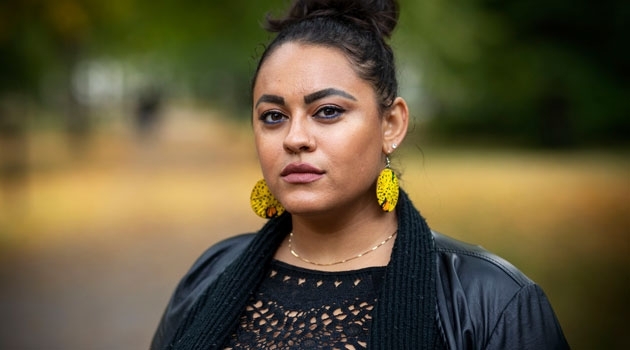Black Lives Matter brings sharper focus to the situation in Sweden
The Black Lives Matter demonstrations in Sweden are partly a question of showing solidarity and supporting the struggle of African Americans in the United States. But it is also about using the global movement to highlight what is happening here, according to Jasmine Kelekay, guest doctoral student at the Centre for Multidisciplinary Studies on Racism (CEMFOR) at Uppsala University.
Jasmine Kelekay is a doctoral student at the University of California, Santa Barbara, but has been in Sweden for the last year to conduct research on resisting racism and Swedish criminal policy.
“I combine two methods: Critical discourse analysis of the racification of Swedish criminal policy and field work with primarily African Swedish activists but also other racified activists.”
The summer of 2020 saw intense debates on police violence against African Americans in the United States. There were many protests, both in the form of demonstrations and campaigns on social media, under the heading of “Black Lives Matter”. These protests also spread to Sweden.
Many more have become involved
Jasmine Kelekay was not at all the demonstrations but was involved in helping to organise some and followed developments closely.
“Many more people have become involved during the summer, and it is interesting to see how African Swedish activists have used American and other international resistant movements as a resource. Since this is also a local phenomenon and problem. It does not necessarily look the same, but it has the same roots and plays out similarly.”
Are there major differences between racism and police violence in the United States and in Sweden?
“The United States is unique in the Western World since as a policy they use firearms much more often and shoot to kill. That’s the major difference that leads to a culture where police know that they can commit violent acts and will not be held accountable.”
The violence is not as visible
In Sweden, police do not use firearms as often, but there are multiple examples of violence with racist overtones, argues Jasmine Kelekay. For example, media reports have discussed how security guards abused a 12-year-old African Swedish boy in Kista Galleria and a pregnant African Swedish woman at Hötorget’s underground station.
“There’s also another type of violence which isn’t as visible since it is not as dramatic and does not happen openly on the street. At the same time, Black people in Sweden experience daily harassment and aggression and even physical violence by police. Very few of the people I have interviewed have not experienced or witnesses this.”
Her research is an attempt to understand developments in criminal policy where there are increasing claims that more police, more controls and more surveillance are needed in Swedish suburbs, while there is a reduction of support to other institutions, like schools and after-school centres. She is also studying how people become involved in resisting this.
“One type of resistance is pointing this out and working against it, but I also see movements that try to build communities and relations as a form of resistance.”
Affects daily life
The research focuses on how policy development affects the daily lives and opportunities for African Swedes. A positive development in the last few years is that it has become easier to get involved and find others with the same experiences. At the same time, a report from the County Administrative Board shows that in terms of education, opportunities for jobs and income differences, it is worse for second- and third-generations than first-generation immigrants.
“I think that when comparing the difference between first- and second-generations immigrants, the situation is worse here in Sweden than in the United States. We talk about segregation as a law of nature, but it is something that has been created by social policies and processes. If you then listen to criminal policy that wants to introduce more repressive measures not aimed at building society, then it is very, very concerning.”
Debate in the Riksdag
The attention around Black Lives Matter has also impacted the situation in Sweden, with a flood of new members to organisations like the African Swedes’ Forum for Justice and the National Association of African Swedes, and the establishment of new organisations like Black Lives Matter Sweden.
Recently, Member of Parliament Momodou Malcolm Jallow initiated the first parliamentary debate ever in Sweden on the situation of African Swedes. At the same time, demonstrators were strongly criticised in the media since they gathered during the coronavirus pandemic.
“This gets a lot of attention, for better or worse, but I hope that it leads to this issue taking a larger place in public discussions on social problems. This would allow more voices to be heard when the repressive measures are proposed. If nothing else, people will be more mobilised if and when such changes occur.”
Annica Hulth

